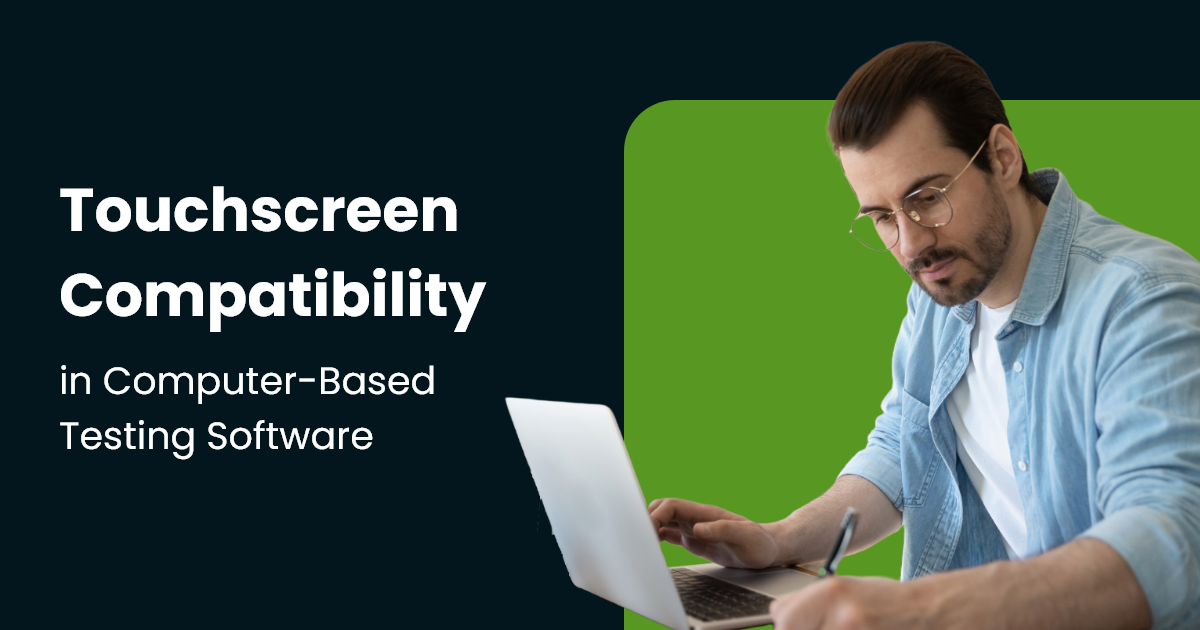Touchscreen compatibility today is the primary feature expected from testing software. This is due to accelerated digital transformations within education and recruitment domains.
As more candidates access assessments through tablets, 2-in-1 laptops, and touchscreen-enabled devices, the need for seamless performance across all interface experiences grows. Think Exam’s advanced computer-based testing software, Think CBT, is designed in alignment with these evolving user behaviours. It ensures that touchscreen compatibility is more than just a feature—it is a major strength.
Why is Touchscreen Compatibility Important in Computer-Based Testing Software?
1. Enhancing Accessibility for Various User Groups
Touchscreen support increases accessibility for adolescent users, differently-abled individuals, and persons with slight digital literacy. Interaction via touchscreen is much easier because it removes the intricacies of attaching peripheral devices.
Think CBT offers an inclusive environment to conduct examinations. In contrast, Proctor U assumes the user is working on a laptop or a desktop. Think CBT seeks to meet the user wherever they are—regardless of the device.
2. Supporting Hybrid and Remote Testing Modes
Remote proctoring and hybrid examination models require testing software to function effectively across several types of devices. With touchscreen compatibility, Think CBT ensures that examination conditions remain the same whether a user is operating from a desktop or a tablet.
This fills a gap where Mercer, Mettl has, on occasion, struggled to offer a consistent mobile interface, especially on lower-end devices.
How Do Computer-Based Testing Software Facilitate the Touchscreen Experience?
1. Fine-tuning Across Screen Sizes
Think CBT is automatically responsive to screen size and resolution. It provides consistent functionality irrespective of the device. Whether it’s a 6-inch or a 12-inch tablet, the interface remains user-friendly and takes full advantage of touchscreen features.
2. Gesture Support for Navigation and Answer Selection
Natural gestures such as swipe, tap, and drag are incorporated into Think CBT. Users can move between sections, select options, and double-check answers using familiar gestures.
3. Input without Errors
Think CBT features virtual keyboards for both numerics and text entries. These keyboards are optimised for touch accuracy and operate smoothly, even on smaller screens.
Benefits of Touchscreen-Compatible Testing Platforms
1. Great Flexibility for the Institute and the Student
Touchscreen compatibility widens the category of devices that can be used. This creates flexibility where schools and companies can administer tests without investing in specific hardware. Think CBT helps clients reduce costs while improving accessibility.
In this respect, Mercer, Mettl has often leaned toward device-dependent solutions.
2. Smooth Functionality in Low Infrastructure Settings
In many developing regions, touchscreen-enabled mobile devices are more available than personal computers. The compatibility of Think CBT with such devices ensures assessments can be conducted even in low-resource environments.
On the contrary, Proctor U requires heavier bandwidth and higher device specifications, which may exclude this user base.
3. Improved Test Completion and User Satisfaction
A smoother interface means fewer technical hindrances. This leads to higher test completion rates and improved user satisfaction when assessments are conducted on touchscreen devices.
Security and Proctoring on Touch Devices
1. Real-time Remote Proctoring Integration
Think CBT supports AI and human-aided proctoring via the front-facing camera. It works reliably with tablets and mobile devices to maintain assessment integrity.
Proctor U users have sometimes described touch device-based proctoring as tricky or unreliable. Think CBT integrates it seamlessly.
2. Data Encryption and Activity Logging
All screen interactions in Think CBT are fully encrypted. The system logs all activity on touchscreen devices, including interaction patterns, timestamps, and navigation. This helps flag discrepancies when detected.
3. Biometric and Image-Based Authentication
Face recognition and biometric authentication features work on touchscreens within Think CBT. This adds a security layer for mobile and tablet-based assessments.
Some platforms like Mercer | Mettl are still rolling out these features for tablets, limiting mobile-based proctored assessments.
Think CBT: The Forefront of Touch-First Testing Solutions
1. Enterprise-Grade Touch Compatibility
Think CBT is not just touchscreen ready—it is touchscreen optimised. It scales enterprise-wide, allowing simultaneous testing across thousands of devices.
Solutions such as Proctor U may lag behind in simultaneous performance benchmarks.
2. Customisable Exam Workflows for Touch Inputs
From drag-and-drop questions to handwriting simulations, Think CBT offers touch-based customisation options. These improve interactivity and evaluation quality.
3. Continuous Updates and Compatibility Testing
Think CBT undergoes regular testing to ensure compatibility with the latest operating systems and devices. This includes Android, iOS, Windows tablets, and convertible laptops.
Think CBT stays ahead with timely updates, while Mercer, Mettl often delays rollouts for new operating systems.
Conclusion
Touchscreen compatibility is no longer a “nice to have” but a must-have in a mobile-first world. The best computer-based testing software should work for all test takers, no matter what device they use.
With its robust touchscreen capabilities, secure environment, and user-centric design, Think CBT leads the future of digital assessment.
FAQs:-
1. What is touchscreen compatibility in computer-based testing software?
- It refers to the software’s ability to work smoothly on touch-enabled devices like tablets and 2-in-1 laptops, allowing users to tap, swipe, and interact without a keyboard or mouse.
2. Does Think CBT support touchscreen devices?
- Yes, Think CBT is fully optimized for touchscreens, offering a responsive interface, gesture support, and virtual keyboards for seamless test-taking.
3. Is touchscreen-based testing secure with Think CBT?
- Absolutely. Think CBT’s computer-based testing software uses secure browsers, remote proctoring, and activity tracking to ensure integrity, even on mobile and tablet devices.
4. What kinds of questions are implemented well on touchscreen devices in Think CBT?
- Think CBT’s computer-based testing software implements standard MCQs, drag-and-drop, hotspot, and subjective input—all programmed to give a good user experience on touchscreen devices.
5. Do they need to install any app for a candidate to take a test on touchscreen devices?
- No app is needed. Think CBT’s computer-based testing software runs directly in web browsers and adjusts to all screen sizes, enabling easy access across devices.








